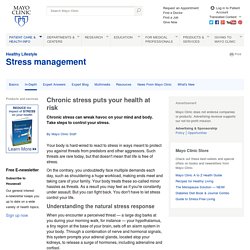

Marvin Minsky on health and the human mind. How to Stop Worrying: Self-Help for Anxiety Relief. Why is it so hard to stop worrying?

Constant worrying takes a heavy toll. It keeps you up at night and makes you tense and edgy during the day. You hate feeling like a nervous wreck. So why is it so difficult to stop worrying? For most chronic worriers, the anxious thoughts are fueled by the beliefs—both negative and positive—they hold about worrying. On the negative side, you may believe that your constant worrying is harmful, that it’s going to drive you crazy or affect your physical health. How to Stop Worrying.
Undoing the Worrying Habit Once acquired, the habit of worrying seems hard to stop.

We're raised to worry and aren't considered "grown up" until we perfect the art. Teenagers are told: "you'd better start worrying about your future". If your worries aren't at least as frequent as your bowel movements, you're seen as irresponsible, childish, aimless. That's a "responsible adult" game rule. To the extent that worrying is learned/conditioned behaviour, it can be undone. Centuries-old cultural conditioning has given us a nasty neurosis: the belief that happiness must be "earned". Laid on top of the first neurosis is the idea that spending money will make you happy. So: we never stop working, we never stop spending money, we're never really happy – ideal conditions, coincidentally, for a certain type of slave economy.
You won't stop worrying if you think it serves you. The fight-or-flight response (FOF) is useful on rare occasions of real danger. Hyperbole and a Half. Progressive Muscle Relaxation (PMR) - How to Reduce Tension with Progressive Muscle Relaxation (PMR) Understanding Stress: Symptoms, Signs, Causes, and Effects. Iron deficiency and behavior. The literature bearing on the behavioral correlates of sideropenia in animals and man is reviewed.

There is evidence to support the contention that sideropenia, per se, is causally related to the subjective complaints of the iron-deficient and/or anemic individual. And, although important biochemical pathways involving electron transport, catecholamine catabolism, and porphyrin synthesis have been shown to be deranged in iron-deficient animals and human beings, the role of these alterations in any putative behavioral aberration is conjectural at present. Given the high prevalence of iron deficiency in the world's population, these issues should be addressed by appropriate biochemical and psychologic studies in animals and human beings. No full text is available.
To read the body of this article, please view the PDF online. 3. The effect of malnutrition on human development. Contents - Previous - Next Introduction: Chronic malnutrition A poor village: Its reality and problems The longitudinal intervention study: Design and implementation The first eight months of life The "valley of death" between 8 and 20 months The preschool survivor and the nutritional crisis at school entrance The teenager who was malnourished as a child Comments: Nutrition in the life cycle and social development References Notes A 24-year Study of Well-Nourished and Malnourished Children Living in a Poor Mexican VillageAdolfo Chávez, Celia Martínez, and Beatriz Soberanes1 Introduction: Chronic malnutrition It was recognized in the 1950s that the severe forms of protein-energy malnutrition, kwashiorkor and marasmus, were associated with marked cognitive effects (Scrimshaw et al., 1968) although the lasting effects on survivors were unknown.

Neurologic Consequences of Malnutrition - Marco T. Medina MD, Dr. Marco Medina. Stress: Constant stress puts your health at risk. Chronic stress puts your health at risk Chronic stress can wreak havoc on your mind and body.

Take steps to control your stress. By Mayo Clinic Staff Your body is hard-wired to react to stress in ways meant to protect you against threats from predators and other aggressors. Stress - The Body's Response. Description An in-depth report on the causes, diagnosis, treatment, and prevention of stress.

Highlights Nearly everyone experiences stress at some time. Stress produces changes in many body systems; examples include increased heart rate and blood pressure and altered immune function. Physical Effects of Stress - general Psychology. Constipation, diarrhea and high blood pressure are some of the physical effects of stress.

To know more about physical and psychological effects of stress, read on... Stress is defined as the body's response to overdose of anxiety. Anxious thoughts that cross our mind before attending a job interview or giving an important examination, gives rise to stress. Effects of Stress on the Body. Not everyone has the same symptoms of stress and thus the effects of stress on your body can vary in each person.

However, no matter what type of stress you have, your body is affected mentally, emotionally and physically. But remember that no one is free from stress, there can be short term stress and long term stress, each have a different effect on the body. The effects of stress on your body can become worse or harder to relieve if you consume alcohol, smoke or use drugs.
Many think that these relieve stress but it actually keeps our bodies stressed and also causes more health problems. When short term stress occurs, each person's body can react in different manner, but most of the times one or more of the following occurs: